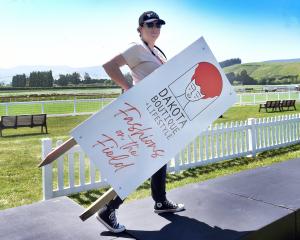News that Central Otago Health Services Ltd and the Southern District Health Board reached agreement this week over funding for Dunstan Hospital came in the wake of a groundswell of support for the hospital from the community it serves. Shane Gilchrist talks to a group of battlers about an earlier fight to retain health services in the district.
Last weekend, Dunstan Hospital staff released a video in which they could be seen dancing in wards and along corridors, accompanied by New Zealand band Six60's song, Rise Up.
Tapping into a groundswell of support, the antics of the nurses, doctors and assorted personnel were upbeat and celebratory.
Reflecting the song's title, the message was also defiant in the context of signals from the Southern District Health Board that it planned health service cuts of up to 5% in rural hospitals within its area.
Rory Gollop, Bev Clark and Shirley Alabaster, veterans of the campaign to rebuild Dunstan Hospital more than a decade ago, might not have been in a mood to dance as they gathered to express their thoughts on the subject earlier this week, yet the message they conveyed was energetic enough.
Mr Gollop, deputy chairman of Central Otago Health Services Ltd (COHSL), the company set up in 1999 to manage Dunstan Hospital, described the group as ''three old warriors'' or, alternatively, ''worriers''.
''In 1997 this hospital was threatened with closure, so the community took ownership of the hospital's business - not the actual buildings, but the services it provided,'' Mr Gollop explained.
''At that time, the hospital was very run down, so the next step was rebuilding it, which happened in 2005. But there was a lot of work involved to get the hospital to a point where it was safe to practise medicine.''
Mrs Alabaster, former chairwoman of Central Otago Health Inc, the parent body and sole shareholder of COHSL, agreed: ''I mean, we called it refurbishment, but there were holes in the floor.''
Mr Gollop: ''All through this period, from 1997 to 2015, it's been a struggle to secure Dunstan's services and to get funding from the entrenched forces that exist in Dunedin.''
• At one point, in 2003, the board of COHSL resigned en masse to protest against the condition of Dunstan Hospital. That move was described as ''petulant'' by then health minister Annette King (Labour).
Mrs Clark, as chairwoman of COHSL, at the time said the board's resignation would remain until the minister gave a written guarantee that $7.6 million of government funds would be made available for the hospital rebuild.
''A meeting we had at the time would have been the biggest public gathering on the subject [at that time],'' Mrs Clark said, referring to a public meeting in Alexandra last month.
One of a series of public events called in response to the SDHB's proposals, it attracted an estimated 1000 people.
History has shown the community of Central Otago was prepared to work hard for what it wanted, Mrs Alabaster, a former chairwoman of support group Friends of Dunstan Hospital, said.
''I think it's very important to recognise how much the community has put into the hospital. Since 1992, when Friends of Dunstan was started, the community has given money time and time again.''
Mr Gollop noted the rebuild of Dunstan Hospital was estimated at around $8.1 million.
''But in the end, we - and the government - got an $11 million complex. The community raised the difference,'' he said in reference to a fundraising campaign that included Friends of Dunstan winning a Trustpower Community Award in 2005.
• Later that year, Dunstan Hospital was officially opened by then prime minister Helen Clark.
''Around the time the decision was made to rebuild Dunstan, Helen Clark said it was the best deal the government had ever had,'' Mr Gollop reflected.
''For me, this is the way communities get ahead - self-help. You can't sit back and expect the government to do everything if you are going to want everything.
''The work that was done a long time ago is still part of this story. We do consider Dunstan to be a centre of excellence for rural health, and that extends to all the GPs and allied health professionals [who work within the COHSL framework].''
• Mrs Clark, of Wanaka, admitted that when she first heard about the intended funding cut, she felt a sense of loss.
''What we have fought for seems to be going backwards.
''I went to that recent meeting feeling really disappointed and I must admit I got a hug from Rory to feel a bit better. I realised that our team is still fighting,'' Mrs Clark said.
Public feedback has also helped.
''I'd go into the supermarket and someone would come up to me and say, `I took my wife to your lovely hospital. I didn't have to drive to Dunedin and it really helped in a crisis'.
''People are so grateful to have such a service here. That's what keeps you going.''
Mr Gollop, while acknowledging the ramifications of any budget cuts, remained optimistic.
''There is a strength and resilience among the COHSL board - and the community - to make the best of what's thrown at us.
''As always, cometh the hour, cometh the man.''
He then glanced at his companions and added ''or women''.
Mrs Alabaster expressed both her concern and intentions another way. She paused.
''Mmmm ...''
Her eyes offered a glimpse of steel.











